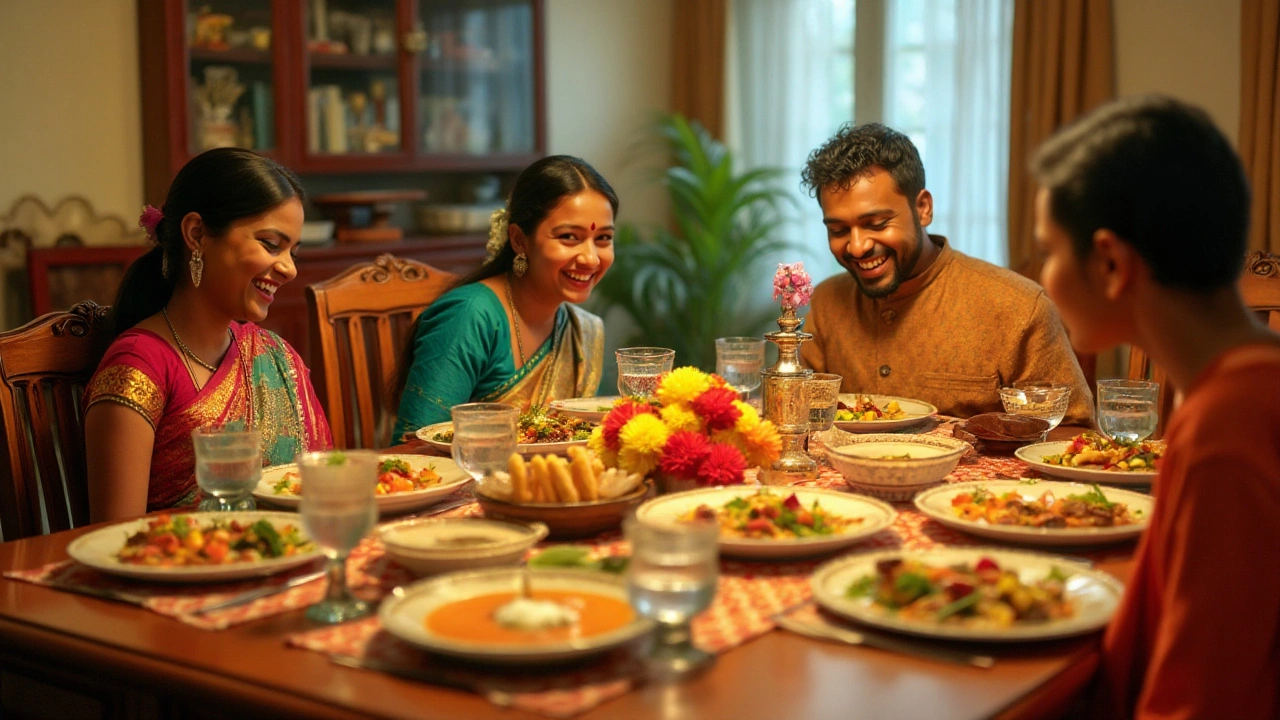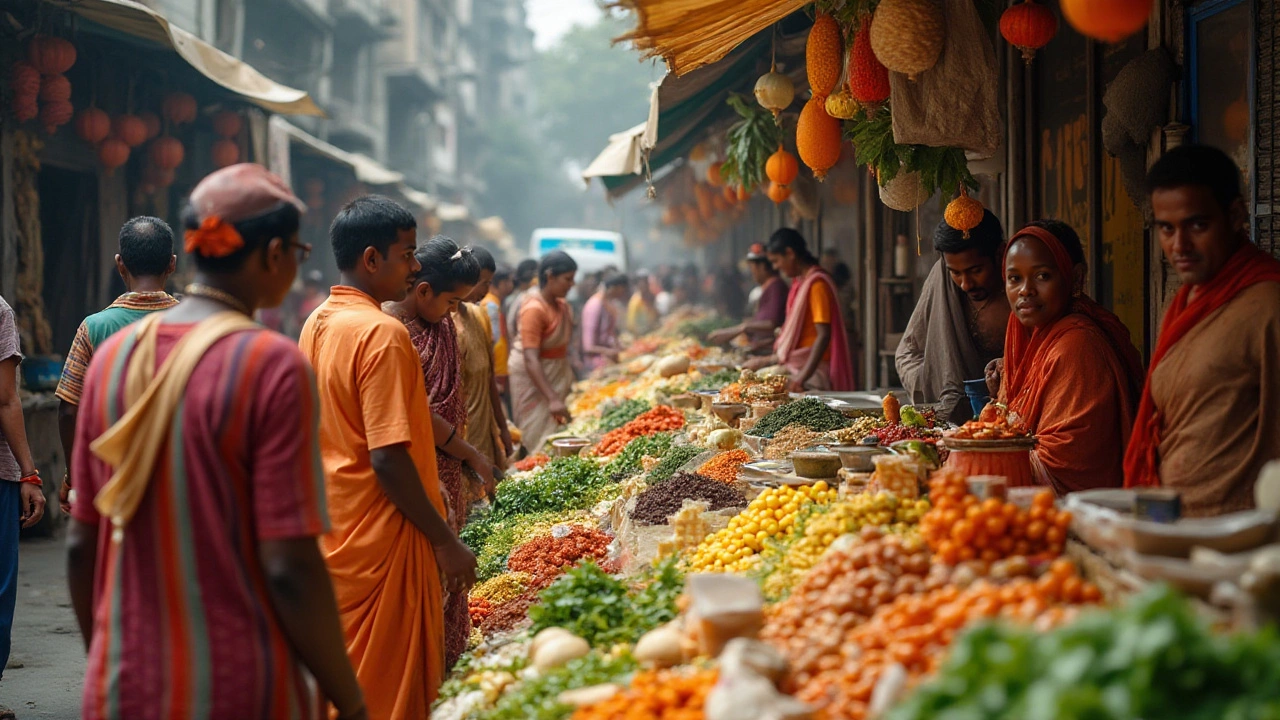If you're passionate about vegetarianism and love exploring cities that celebrate this way of life, India offers an intriguing destination. Nestled within its vibrant landscape is a city renowned for its dedication to pure vegetarianism, where the aroma of spices and herbs dances in the air and vegetarian cuisine defines daily living.
This city is more than just a geographic location; it's a cultural phenomenon shaped by centuries-old traditions and beliefs that hold vegetarianism as a moral and spiritual choice. Here, you'll embark on a culinary journey unlike any other, where local dishes are crafted with care and respect for plant-based ingredients, honoring both taste and tradition.
- The Heart of Vegetarianism in India
- Cultural and Religious Influences
- Local Vegetarian Delicacies to Try
- Vegetarian-Friendly Dining Experiences
- Tips for Visiting Vegetarian Cities
- The Impact of Vegetarianism on Local Life
The Heart of Vegetarianism in India
The bustling city of Ahmedabad, nestled in the vibrant state of Gujarat, emerges as a beacon for those seeking to explore pure vegetarian lifestyles. Known for its deep-seated cultural and historical significance, Ahmedabad not only thrives on its rich heritage but also on its unique commitment to vegetarianism, a practice woven seamlessly into the very fabric of its society. A stroll down the city's streets reveals an array of flavors that can only be described as a vegetarian's paradise. Here, the vibrant hues of spices and fresh produce sparkle in markets, offering ingredients that embody the essence of Gujarati cuisine.
"Gujarat is unique in its stride toward vegetarianism," says renowned food historian, Pushpesh Pant. "Not merely by tradition, but by embracing it as a way of life."
The embrace of vegetarianism in Ahmedabad finds its roots in a blend of cultural and religious influences. With a substantial Jain and Hindu population, non-violence and respect for all life forms are principles firmly ingrained in the city's ethos. The local cuisine proudly features beloved dishes like khaman, undhiyu, and fafda, each crafted with ingredients like lentils, vegetables, and savory spices. The flavors are complex and enticing, culminating in a culinary experience that is as nutritious as it is delicious. Residents often gather for meals that reflect the community's celebrated vegetarian identity, sharing not just food, but stories and traditions.
Visitors to Ahmedabad are often struck by the prevalence of vegetarian eateries, ranging from humble street stalls serving piping hot samosas to sophisticated restaurants offering innovative takes on traditional dishes. Every corner boasts an establishment ready to serve hearty portions that satisfy the soul. One of the city's iconic delicacies, the dabeli, sandwiches spicy mashed potatoes in a bun, garnished with pomegranate seeds and sev, capturing the spirit of Gujarati flavors.
Interestingly, the dedication to purity in vegetarian cuisine doesn't stop at abstaining from meat. It also extends to the use of local, organic ingredients and time-honored cooking methods that prioritize health and sustainability. Ahmedabad is a pioneer in the organic farming scene, with farmers' markets showcasing locally grown produce that not only supports the economy but also encourages a wholesome lifestyle.
In the heart of Ahmedabad, the tradition of vegetarianism transcends the dining table, impacting everything from local business practices to cultural festivals. Events such as the Navratri festival see people engaging in a synergy of music, dance, and vegetarian feasting, underscoring the city's dedication to this vibrant culinary tradition. This city's commitment to vegetarianism isn't just a practice; it's a celebration of life itself, nurturing both the body and spirit.
Cultural and Religious Influences
In India, dietary preferences are intricately woven into the fabric of its cultural and religious landscape. This connection is particularly vivid in the city that upholds its pure vegetarian ethos. A significant portion of the population in this city adheres to Jainism, a religion known for its strict vegetarianism, eschewing even root vegetables like onions and garlic due to their belief in non-violence and minimal harm to living beings. This principle, known as 'Ahimsa', is not simply a dietary choice but a spiritual and ethical guideline that influences many aspects of life. The influence of Jainism, alongside Hinduism's reverence for cows and other creatures, forms a compelling tapestry that shapes the city's dietary norms.
Hinduism, with its myriad of festivals, also plays a crucial role in emphasizing vegetarianism. Many Hindus in this city choose to avoid meat on specific days dedicated to deities, during observances like Vaishnavism, which favors a plant-based diet as a form of offering to Lord Krishna. The rich heritage of India's religious diversity converges here, resulting in a dominant societal embrace of vegetarianism for both spiritual fulfillment and health benefits. Over time, this commitment has transformed into a collective cultural identity that residents are proud to share with others.
Street markets teeming with fresh vegetables and fruits are a common sight, echoing the city's profound respect for plant-based foods derived from religious and cultural practices. Seasonal festivities bring the city to life, inviting locals and visitors to indulge in religious ceremonies and feasts that honor long-standing traditions. From Diwali to Ram Navami, celebrations are marked not only by vibrant decorations but also by the vegetarian delicacies that are central to these occasions. The city's commitment to retaining these age-old practices is a testament to how deeply cultural and religious influences are embedded into its identity.
Food, festivity, and faith take center stage daily, guiding the city's residents in their dietary choices. Living here means experiencing a synergy of ancient beliefs and modern interpretations of vegetarianism, which is why it stands out among Indian vegetarian cities. A unique feature of this city is the way vegetarianism crosses boundaries of faith and becomes a unifying force. Even in a socially diverse context, the practice brings communities together, transcending religious lines. Whether one visits for personal exploration or spiritual pilgrimage, the city's dedication to this lifestyle offers an enlightening experience.
"It's not just about adhering to a diet; it's about embracing a philosophy that respects all forms of life," said a prominent local historian during a recent interview on the cultural significance of vegetarianism in the city.

Local Vegetarian Delicacies to Try
Embarking on a culinary adventure in this Indian city devoted to pure vegetarian cuisine is akin to diving into a treasure chest brimming with flavors, textures, and aromas. While many Indian cities offer a delightful array of vegetarian foods, this particular city elevates vegetarian dining to an art form. A visit here means indulging in time-tested recipes, made with love and a dash of tradition. The famous 'Kachori Sabzi' is a spicy delight not to be missed. It marries crispy, flaky pastries filled with spiced lentils or potato with a side of tangy potato curry, creating a harmonious explosion of taste with every bite.
For the sweet tooth, the city's renowned 'Ghevar' takes center stage. A honeycomb-like sweet, this crispy, fragrant disc is soaked in sugar syrup and often garnished with dry fruits or a dollop of fresh cream. It boasts a highly intricate preparation process that results in a delight which is as pleasing to the eyes as it is to the tongue. The preparation method dates back centuries, emphasizing precision and patience. Sweet vendors start their day early to ensure you enjoy it at its freshest and most delectable.
"The best vegetarian food is not just about removing meat; it's about creating a symphony of flavors that sings to the soul." — Renowned Chef Sanjeev Kapoor
Don't overlook the 'Dhokla,' a fluffy savory cake made from fermented batter of rice and chickpea flour. The fermentation not only enhances its nutrient profile but also imparts a subtle sourness that complements its spicy topping. This soft, tangy, and seasoned delight is often enjoyed with a side of mint chutney and green chilies. Whether served as a breakfast dish or an all-day snack, Dhokla has found its place in the heart of this city's vegetarian fare, embodying both simplicity and culinary finesse.
While the traditional thali offers a complete window into the city's vegetarian offerings, don't miss out on modern adaptations that simultaneously respect and reinvent long-standing culinary traditions. 'Paneer Masala' stands out as a crowd favorite. The soft, melt-in-the-mouth paneer cubes are cooked in a rich, spicy, and aromatic masala gravy, embodying the city's flair for mixing spices to perfection. Throughout the city, food markets bustle with vendors showcasing a kaleidoscope of fresh produce, grains, and spices, all central ingredients in crafting these delicious dishes.
The impact of the city's pure vegetarian ethos resonates strongly through its cuisine, often dictating not just what ends up on the plate but how it is presented and enjoyed. Celebrating special occasions or simply gathering with family becomes a culinary event highlighted by the heart and soul put into each delicacy. The menu is not just about feeding the body but nourishing the spirit, showcasing a harmonious blend of the city's cultural, religious, and historical narratives.
Vegetarian-Friendly Dining Experiences
In the heart of the city known as India's vegetarian city, your taste buds are in for a delightful surprise. The local dining scene is a tapestry of flavors, colors, and textures that reflect a deep-rooted tradition of plant-based culinary art. Whether you're strolling through busy streets or unearthing hidden culinary gems, each restaurant and café here offers a unique homage to vegetarianism. Restaurants often feature extensive menus that showcase the ingenuity of Indian chefs in transforming simple vegetables, grains, and legumes into gourmet masterpieces. From humble street food stalls to exquisite fine dining establishments, there's a plethora of options catering to diverse palates—all without a shred of meat.
Many eateries pride themselves on remaining strictly vegetarian, aligning with cultural traditions and religious practices. This dedication creates a dining atmosphere rich in authenticity and offers a diverse array of dishes that go beyond standard fare. Savoring a traditional thali, a sumptuous platter brimming with an assortment of dals, sabzis, chutneys, and sweet delights, not only fills your belly but also offers a lesson in the culinary heritage of the region. Street vendors, too, have mastered the art of the quick bite, with offerings such as spicy samosas and crispy dosas that can be tried on the go.
For vegetarians who enjoy a slight twist, fusion dishes have gained popularity, enticing both locals and tourists with innovative combinations that marry traditional recipes with modern culinary techniques. It is here you'll find carrot kebabs with a hint of smoked paprika or beetroot bajji complemented with tangy wasabi dips—bold experiments that maintain vegetarian integrity while challenging the palate. Such dishes exemplify how Indian food has embraced creativity while remaining true to its roots. Food festivals are another vibrant aspect of this city, often celebrated with gusto, showcasing everything from age-old recipes to recent innovations in plant-based cuisine. This fervor reminds one of India’s living cultural narrative that's ever-evolving.
"In this city, being vegetarian is not just a dietary choice, it is a way of life," says renowned Indian chef, Manish Mehrotra.
Dining here is as much about the experience as it is about the food itself. The warm hospitality found in local establishments makes dining out a cherished social engagement. Friends and families often gather around, relishing meals served on banana leaves, a reflection of the deep connection between nature and food. Dining environments range from bustling and energetic to serene and intimate, accommodating every mood and occasion. In such settings, facilitating conversations centered around family, spirituality, or even business, meals become a bridge connecting past traditions with contemporary lifestyles.
| Dining Experience | Venue Type | Price Range |
|---|---|---|
| Traditional Thali | Local eateries | ₹200 - ₹500 |
| Street Food Bites | Street vendors | ₹50 - ₹150 |
| Fusion Delights | Modern bistros | ₹300 - ₹1000 |
For those who venture into this city's culinary realm, the experience is more than mere sustenance. It represents a journey through flavors and traditions that speak volumes about the community’s heart and soul. More than just a veggie-friendly city, it is a testament to the harmonious coexistence of culinary arts and religious values, illustrating why vegetarianism remains so cherished in various parts of India. It's a place where every meal can be a celebration of life, a sharing of history, and a tasting of India's boundless spirit.

Tips for Visiting Vegetarian Cities
Exploring a city that embraces vegetarianism can be a delightful adventure, offering not just a feast for the palate but also for the soul. When planning your visit to a vegetarian-friendly city in India, there are several tips that can enhance your experience and ensure you make the most of your stay. First, familiarize yourself with the local culinary scene. Indulge in traditional meals at well-known eateries that specialize in vegetarian dishes. These establishments often serve meals prepared with age-old recipes that reflect the cultural heritage of the region. Participating in food trails or guided culinary tours can also be a fantastic way to discover hidden gems and learn about the stories behind these delicious creations.
Understanding the cultural and religious significance of vegetarianism in the city will also enrich your travel experience. Many areas in India practice vegetarianism due to deep-rooted religious beliefs, and knowing this can help you appreciate the depth of the lifestyle choice. Visit local markets and temple towns, where you can see and taste offerings that have been part of the local customs for centuries. While you're there, respect and embrace the local customs which often encourage communal dining and sharing of meals. This offers a unique opportunity to connect with locals and learn more about the social and cultural fabric of the city.
When dining, anticipate a creative array of vegetarian delights ranging from street food to sophisticated gourmet dishes. Make it a point to try seasonal vegetables and fruits unique to the area. Don’t shy away from asking about the ingredients and preparation as locals are usually proud to share their culinary practices. Another key tip is to plan your visit around a festival or a special occasion. Festivals offer a vibrant display of regional foods and offer a glimpse into the celebratory spirit of the city. Sampling festival-specific cuisine will not only satiate your tastebuds but also provide a richer understanding of the culture.
While exploring, keep in mind the convenience of traveling light and dressing modestly, especially if you plan to visit temples or sacred sites that often require such attire. Navigate through bustling local markets, which are fantastic venues to delve into the essence of the city's food culture and purchase authentic spices to take home. A little bit of language learning can come in handy too. Knowing a few basic words or phrases like ‘vegetarian’ or ‘no meat’ in the local language can greatly help in communication.
Lastly, accommodations in these cities can range from luxurious hotels to cozy guesthouses, many offering vegetarian meals as part of their hospitality. Choose accommodations that are centrally located, offering easy access to popular dining spots. With the right preparation and mindset, visiting a pure vegetarian city becomes more than just a trip; it’s a culinary and cultural immersion that delights the senses. As Mahatma Gandhi said, life is not worth living without having someone to eat with, cherish the community feeling as you savor each vegetarian bite.
The Impact of Vegetarianism on Local Life
In the city where pure vegetarianism is embraced with fervor, life takes on a special rhythm deeply influenced by culinary practices. This devotion to a plant-based lifestyle has permeated every aspect of local culture, social norms, and daily behavior. From bustling street markets showcasing vibrant arrays of fresh produce to religious ceremonies that emphasize purity through food, vegetarianism is not just a diet; it's a way of life.
The local economy thrives on this unique cultural element, with numerous entrepreneurs establishing businesses that cater specifically to the vegetarian community. Restaurants pride themselves on innovative dishes that tempt even the most discerning palates, and local chefs have become celebrities of sorts, celebrated for their ability to craft delicious meals from simple plant-based ingredients. This has led to a burgeoning culinary tourism industry, drawing visitors from far and wide who are eager to taste the city's famous vegetarian feasts. The local government, recognizing the importance of this aspect of their cultural heritage, often promotes vegetarian festivals that celebrate both food and life.
Education in this city often includes teachings on the environmental and health benefits of vegetarianism. Schools incorporate lessons on sustainable agriculture and healthy eating habits, nurturing a generation of informed individuals who understand the impact of their dietary choices. Health statistics often reflect lower incidences of lifestyle-related diseases, a testament to the community's commitment to vegetarian living.
According to a study by Vegetarian Times, 'Vegetarians often exhibit lower levels of LDL cholesterol and have a reduced risk of heart disease.'This ethos of conscious living extends into family settings, where traditional recipes are lovingly passed down through generations, preserving both culture and wisdom.
Social life in the city reverberates with the principles of vegetarianism, fostering a sense of community and shared values. Festivals are vibrant occasions marked by the preparation and sharing of sumptuous vegetarian dishes. During these celebrations, homes are filled with the laughter of family and friends who gather to reconnect and enjoy plant-based meals. The sense of neighborhood unity is palpable, as everyone takes part in these joyous occasions. Moreover, this lifestyle choice has encouraged neighborhoods to create community gardens, fostering green spaces that are both nourishing and beautiful, a testimony to the harmony between humanity and nature.
Interestingly, a significant number of non-vegetarians visiting the city often choose to explore vegetarianism during their stay, influenced by the compelling displays of culinary artistry and the evident health benefits experienced by locals. This city serves as an ambassador for vegetarian-friendly living, showing the world how plant-based diets can be both satisfying and enriching on multiple levels.
